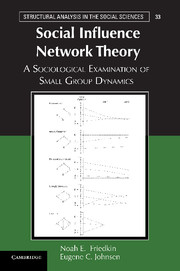Book contents
- Frontmatter
- Contents
- List of Tables and Figures
- Acknowledgments
- Preface
- PART I INTRODUCTION
- PART II INFLUENCE NETWORK PERSPECTIVE ON SMALL GROUPS
- PART III LINKAGES WITH OTHER FORMAL MODELS
- Epilogue
- Appendix A Fundamental Constructs and Equations
- Appendix B Total Influences and Equilibrium
- Appendix C Formal Analysis of Dyadic Influence Systems
- Appendix D Social Positions in Influence Networks
- Appendix E Goldberg's Index of Proportional Conformity
- Appendix F Gender-Homophilous Small Groups
- References
- Index
Epilogue
Published online by Cambridge University Press: 03 May 2011
- Frontmatter
- Contents
- List of Tables and Figures
- Acknowledgments
- Preface
- PART I INTRODUCTION
- PART II INFLUENCE NETWORK PERSPECTIVE ON SMALL GROUPS
- PART III LINKAGES WITH OTHER FORMAL MODELS
- Epilogue
- Appendix A Fundamental Constructs and Equations
- Appendix B Total Influences and Equilibrium
- Appendix C Formal Analysis of Dyadic Influence Systems
- Appendix D Social Positions in Influence Networks
- Appendix E Goldberg's Index of Proportional Conformity
- Appendix F Gender-Homophilous Small Groups
- References
- Index
Summary
Small groups take many forms in natural settings and generally involve discussions of issues of interest to their members. In sociology, at least since Cooley's (1983 [originally published 1902]) observations on primary and secondary groups, various types of groups (families, gangs, communes, work-groups, etc.) have been investigated in field settings as possible sites of important symbolic interactions and the formation of interpersonal agreements. Interpersonal influence networks are implicated in all such groups and, therefore, the development of our understanding of the implications of such networks is a fundamental problem. When group size is scaled upward to the meso-level (e.g., organizations and communities) and to the macro-level (e.g., large populations), influence networks also are present for issues of general salience to the members of these larger collectivities. In such meso and macro collectivities, when interpersonal influences affect members' attitudes toward particular objects and, in turn, their object-related behaviors, influence networks are also fundamental to an understanding of collective action, social diffusion, and behavioral cascades.
Our work, in this volume, focuses on the basic mechanism by which an influence network becomes a meaningful construct, and through which we might analyze the implications of influence networks. We are not exclusively wedded to the experimental settings in which we have examined the implications of influence networks. It appears evident to us that the analysis of interpersonal influences within groups in field settings will be placed on firmer theoretical grounds when it can be demonstrated that particular approaches to the construct of an influence network provide accurate predictions of small group outcomes in experimental settings.
- Type
- Chapter
- Information
- Social Influence Network TheoryA Sociological Examination of Small Group Dynamics, pp. 303 - 312Publisher: Cambridge University PressPrint publication year: 2011



